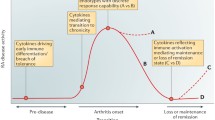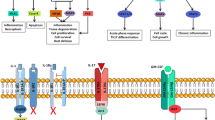Summary
Rheumatoid arthritis (RA) is a debilitating disease of unknown etiology. Although the pathogenesis of RA is multifactorial, the contribution of cytokines is undoubtedly pivotal in the progression of the inflammatory process. One cytokine gaining recognition for its importance in inflammation is macrophage migration inhibitory factor (MIF). Initially described as a biological activity, a broad range of functions of MIF has emerged including induction of proinflammatory mediators as well as demonstrated roles in both innate and adaptive immunity. In RA, increased MIF levels have been demonstrated in serum, synovial fluid and tissue with the latter correlating with disease activity. In vitro, MIF induces production of key proinflammatory genes operative in arthritis, including IL-1, TNF, IL-6, IL-8, COX-2, PLA2, and MMPs. In addition, MIF regulates proliferation and apoptosis via direct effects on the tumor suppressor protein p53 implicating a role for MIF in synovial hyperplasia. In vivo, MIF antagonism or MIF deficiency result in decreased disease severity in animal models of RA further confirming a role for MIF in joint inflammation. Interestingly, MIF is induced by glucocorticoids and MIF in turn antagonises glucocorticoid effects. This unique relationship presents antagonism of MIF as a potentially effective steroid-sparing therapy.
Zusammenfassung
Die rheumatoide Arthritis (RA) ist eine Erkrankung unbekannter Ätiologie, welche mit schweren Behinderungen einhergehen kann. Obwohl die Pathogenese der RA multifaktoriell ist, tragen Zytokine zweifellos wesentlich zur Progression der entzündlichen Prozesse bei. Der Macrophage Migration Inhibitory Factor (MIF) ist ein Zytokin, dessen Bedeutung für Entzündungsprozesse zunehmend erkannt wird. MIF hat eine Anzahl von biologischen Wirkungen wie zum Beispiel die Induktion von proinflammatorischen Mediatoren im natürlichen und spezifischen Immunsystem. Bei der RA wurden erhöhte MIF-Spiegel im Serum, in der Synovialflüssigkeit und im Synovialgewebe nachgewiesen: letztere korrelieren mit der Krankheitsaktivität. In vitro induziert MIF die Produktion von für die Arthritis wichtigen proinflammatorischen Genen wie Interleukin-1, TNF, Interleukin-6, Interleukin-8, COX2, PLA2 und MMPs. Zusätzlich reguliert MIF die Proliferation und Apoptose über direkte Effekte auf das Tumor-Suppressor-Protein p53, was eine Rolle für MIF bei der Synovia-Hyperplasie nahe legt. In vivo führt die Antagonisierung oder die Defizienz von MIF in Tiermodellen der RA zu einer verminderten Krankheitsaktivität und bestätigt damit die Rolle von MIF bei der Gelenksentzündung. Interessanterweise wird MIF durch Glukokortikoide induziert, während MIF andererseits Glukokortikoid-Effekte antagonisiert. Diese Daten legen die Antagonisierung von MIF als potentielle Glukokortikoid-sparende Therapiestrategie nahe.
Similar content being viewed by others
Author information
Authors and Affiliations
Corresponding author
Rights and permissions
About this article
Cite this article
Santos, L.L., Morand, E.F. The role of macrophage migration inhibitory factor in the inflammatory immune response and rheumatoid arthritis. Wien Med Wochenschr 156, 11–18 (2006). https://doi.org/10.1007/s10354-005-0243-8
Received:
Accepted:
Issue Date:
DOI: https://doi.org/10.1007/s10354-005-0243-8




